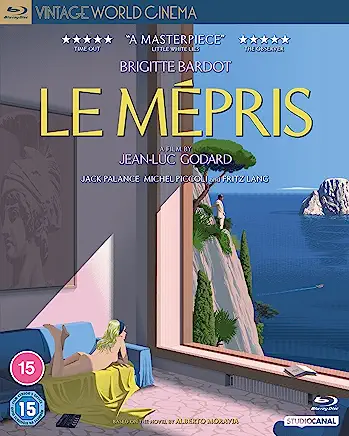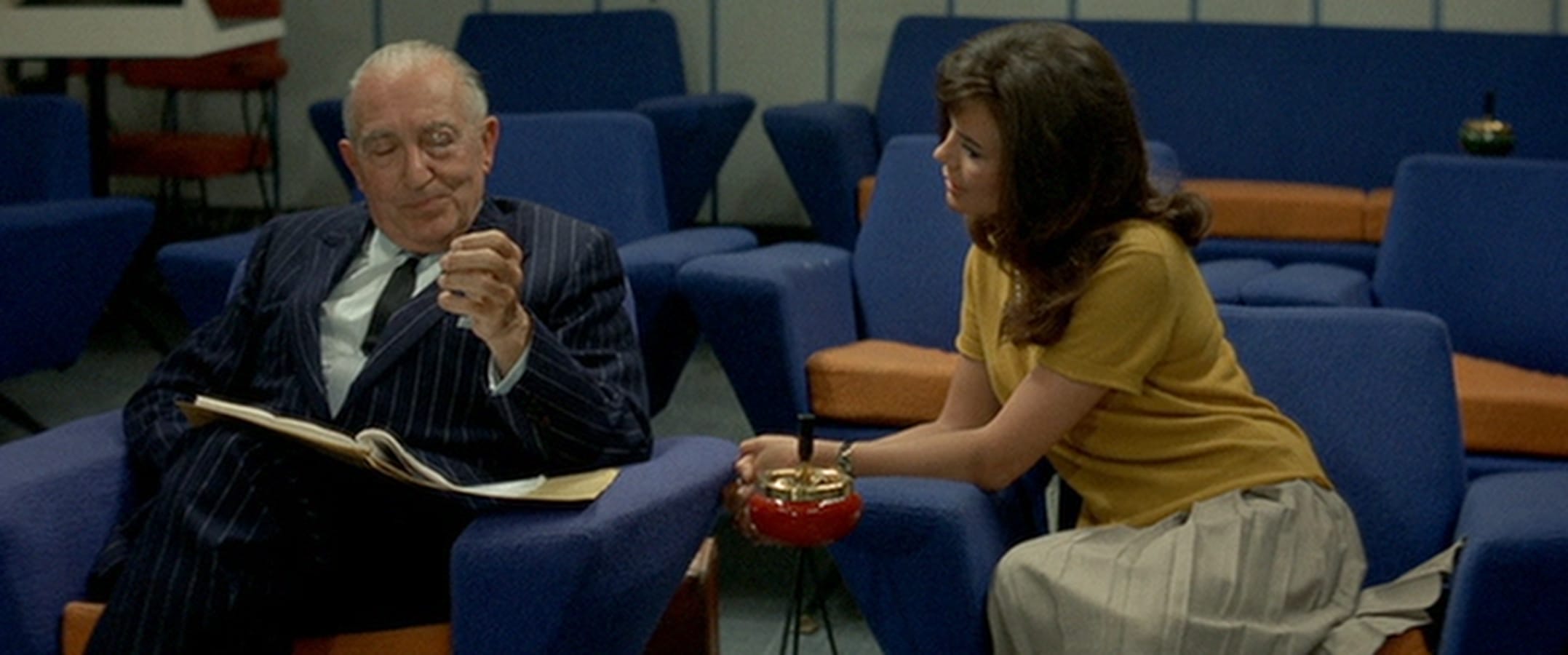It’s an odalisque to arouse envy in Titian, Boucher, Ingres, or Manet.
Filtered amber, white, and blue lights successively bathe Brigitte Bardot, crowned by that golden cloud, as she asks Michel Piccoli, her co-star and screen husband in Jean-Luc Godard’s Le Mépris (1963, Contempt), to evaluate her naked body’s flawless components while she inventories them post-coitally – feet, ankles, knees, thighs, behind, breasts, nipples, shoulders, arms, face, mouth, eyes, nose, ears.
In assessing her economic power as a sexual commodity, however, Bardot (playing ex-typist Camille Javal but also herself) doesn’t deliver on it, either through body language or verbal inference. The scene is unerotic. Godard only filmed the star without her clothes because he was pressured to by Joe Levine, the Hollywood peplum producer who financed Le Mépris with Carlo Ponti and French New Wave champion Georges de Beauregard, half the $1 million budget paying Bardot’s salary.
Godard brutally channelled Levine in the film as the crass, belligerent Jeremy Prokosch (Jack Palance), who has hired Piccoli’s playwright Paul Javal to troubleshoot the screenplay of a sword-and-sandal version of The Odyssey that, infuriating Prokosch, Fritz Lang (playing himself) is turning into an arthouse movie during its shoot at eerily deserted Cinecittà in Rome and at Prokosch’s Casa Malaparte villa on Capri. One wonders when Levine realized Godard was making an arthouse movie (albeit an accessible one) that mocks the Hollywood fad of exploitative classical trash.
 Godard closely adapted Le Mépris from Alberto Moravia’s 1954 novel Il Disprezzo but reformulated it as a Homeric allegory (Paul is Odysseus, Camille is Penelope and the Sirens, Prokosch is Poseidon and the Suitors) on his and his actress-wife Anna Karina’s ailing marriage.
Godard closely adapted Le Mépris from Alberto Moravia’s 1954 novel Il Disprezzo but reformulated it as a Homeric allegory (Paul is Odysseus, Camille is Penelope and the Sirens, Prokosch is Poseidon and the Suitors) on his and his actress-wife Anna Karina’s ailing marriage.
The film is also a requiem for Hollywood’s zenith as a factory for masterpieces helmed by Chaplin, Sternberg, Lubitsch, Lang, Sternberg, Ford, Hawks, Hitchcock, Welles, Nicholas Ray, Fuller, Tashlin and other giants revered by Godard and his fellow Cahiers du Cinema critics turned New Wave directors.
Godard’s meditations on these themes are essayistic, their cold rationalism evoked through affectless interactions, the dissonant mix of classical and modernistic mise-en-scène (as identified by film scholar Adrian Martin), Brechtian sloganeering (per André Bazin, “Cinema substitutes our gaze for a world more in harmony with our desires”), and dialogue frequently repeated. Prokosch’s assistant producer and mistress Francesca Vanini (Giorgia Moll) is charged with translating French, Italian, German and English for the crew of Prokosch’s international co-pro, though Godard supposedly used the language mix as a ruse to control his scathing satire.
Contemptuous of the producer (“CinemaScope is not for men but snakes and funerals”), the old master Lang is Godard’s charming philosophical mouthpiece. Godard plays Lang’s assistant director. But Piccoli – asked by Godard to wear Godard’s tie, shoes, and the hat that the director wore aping Dean Martin in Some Came Running – is emphatically the onscreen JLG. The film’s cinematographer Raoul Coutard said: “I’m positive that [Godard is] trying to explain something to his wife. It’s a letter that’s costing [the producers] a million dollars.”
The narrative turns on Camille’s escalating contempt for Paul – for seeing him pat Francesca’s bottom, for allowing the predatory Prokosch to drive Camille to his Roman villa in his roaring two-seat Alfa Romeo, for Paul’s compromising himself artistically. Fearing Paul might even be pimping her to the odious money man, Camille finally loses faith in the marriage during the uninterrupted half-hour bicker-fest in their Rome apartment, when she dons Karina’s Louise Brooks-ish Vivre sa vie wig. Paul, eaten by jealousy, pesters her so much about her falling out of love with him that it becomes a self-fulfilling prophecy. (Pictured below: Fritz Lang, Giorgia Moll) For all of Godard’s anti-sentimentalism and intellectual disdain, Le Mépris is wrenching. Little is sadder than the death of love. Observed by statues of Poseidon and Athena, Bardot gives her subtlest performance as a woman saddened by the realisation that her husband is buyably weak, and who bows to her fate. Georges Delerue’s majestic mournful score (which Martin Scorsese incorporated in Casino) conveys ancientness and inevitability: all sparks will burn out.
For all of Godard’s anti-sentimentalism and intellectual disdain, Le Mépris is wrenching. Little is sadder than the death of love. Observed by statues of Poseidon and Athena, Bardot gives her subtlest performance as a woman saddened by the realisation that her husband is buyably weak, and who bows to her fate. Georges Delerue’s majestic mournful score (which Martin Scorsese incorporated in Casino) conveys ancientness and inevitability: all sparks will burn out.
“Cinema is an invention without a future” reads one of the slogans. Le Mépris’s chickens have come to roost. The Hollywood auteur cinema lauded by Godard is finally sinking from view in the 2020s with Scorsese among the few holdouts. Treasured islands like Le Mépris – restored on 4K and re-released by StudioCanal Blu-ray with a clutch of extras, not all new – remind us what's been lost.















Add comment